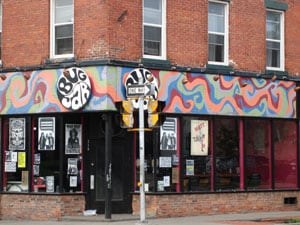The Black Keys Talk To The 13th Floor (Interview)
It won’t be long until The Black Keys return to New Zealand for two shows in Christchurch and Auckland. The dynamic duo has been touring the world in support of their latest album, Turn Blue. This time around the band will feature England’s Band Of Skulls as their support act…a double bill that is not to be missed. The 13th Floor’s Marty Duda spoke to The Black Keys’ Patrick Carney last year, as the band was just beginning their tour of the US. Patrick was very forthcoming, reminiscing about previous New Zealand tours and discussing the special relationship he and band mate Dan Auerbach share.
Click here to listen to the interview with Patrick Carney of The Black Keys:
Or read a transcription of the interview here:
MD: So you guys are touring throughout the north east. I see you did Pittsburgh and Detroit and Cleveland. It seems like that’s your meat and potatoes. Do you feel like that’s your audience and is there a special thing that happens when you’re playing in front of those people?
PC: Well, you know, I think when we play like Cleveland, like the Midwest, it feels like home. But yeah, we feel connected to… you know anytime we play a show, regardless of the area, but yeah I mean, I think because we spent so much time playing, I guess places like Rochester and Buffalo and you know, I guess, cities that a lot of bands haven’t played as many times as us. We’re able to tour North America, this tour’s 50…I think we got 50 shows and well 15 of those, 20 of those are major markets and 30 of them are, you know, cities with less than like 750,000 people or something.
MD: Yeah. I saw that you performed Bob Seger’s Ramblin’ Gamblin Man in Detroit. Is that something you do on a regular basis, find something to cover to kinda fit in with wherever you are?
PC: No we do it occasionally. And in Detroit Bob Seger was thinking about maybe coming out to the show. We decided to work that song off in case he wanted to do a…in case he wanted to play it. But he ended up not coming to the show so we would have played it anyway.
MD: It would have been cool if he had been on there with you. When you played Ohio was there a feeling of homecoming? Is it anything different for you guys than playing anywhere else?
PC: You know, it always feels good, it is kind of like a homecoming thing. It’s a good way for us to start tours. We started like the last two in Ohio and it’s a little more relaxed because it makes me feel at home and also at the same time we get all the insane guest list shit out of the way.
MD: Right.
PC: This time it was still pretty nuts, but the last time we played Cleveland in 2012 there were like 500 people backstage after the show. Dan and I were getting so overwhelmed we had to split.
MD: Right, right. Fair enough.
PC: Yeah.
MD: Does everybody just kind of want to spend a certain amount of time with you backstage? What happens when that happens?
PC: Yeah I mean these are just like people want something signed and they want a photograph or… but usually like you know, in Ohio especially, they’re friends of friends, you know, so I like, we got it down, this time there were only like 150 people back there. I was back there for an hour.
MD: You got to draw the line somewhere.
PC: Yeah. The last thing I want to do is like someone to come backstage and then me to ignore them.
MD: Right. Yeah.
PC: So when there were that many people last time right, I just didn’t even go in the room because there was no way possible to even like take pictures with everybody in there, it was too much. There was like, our parents giving passes to their friend that works in the coffee shop or something. It just got a little bit insane.
MD: Now, you guys have been to New Zealand several times over the course of your career. I think the first time that you were here was back in 2005 when you played The Kings Arms which is a tiny little place right around the corner from where I’m at. I’m wondering if you have much of a recollection of having been here and how the band has, you know, the reaction has changed over the course of the amount of times that you were here?
PC: Yeah I remember the first time we were there. We played with The Fiery Furnaces at The Kings Arms. And yeah, I’m trying to think..there was definitely, yeah, 500 people or something.
MD: Yeah.
PC: Yeah, I remember, you know, having a lot of fun at the show and then, the crowd was great. That’s the only time we’ve ever played with The Fiery Furnaces.
MD: Right.
PC: I don’t know, I’m trying to think, the next time we came back was 2008.
MD: Yeah.
PC: We went to Auckland again and things were a little bit bigger I think.
MD: Yeah, I think you played to Powerstation.
PC: Yeah I think it was Christchurch then and Wellington as well. What really blew my mind was the last time we were there going from like…cause I think it was just from like 500 to a 1000 to, I think it were 10,000 people at the Auckland show last time.
MD: Yeah. The Vector right.
PC: That kind of things only happens to us in a few places where we’ve kinda gone from like…without playing 30 shows… gone to the 10,000 seats. It happened in Spain, in Portugal are the only places that’s happened.
MD: It does have to blow your mind. It seems like that’s the thing that doesn’t happen as much in music any more that bands build up and get to the point where they go from playing 500 people to 10,000. They seem to kind of level out somewhere, you’ve managed to come through that.
PC: Well yeah it’s weird because, you know, like we’re sort of playing Rochester tonight, our first show here was 2003 at The Bug Jar, I think it was called.
PC: Okay, so that was like, what, 200 people maybe and this was probably like, I don’t know, our tenth show in Rochester and tonight we’ll play to like 7000 people. At least when you have that, you know, and Rochester is kind of a weird city because we haven’t played it as much as places like Cleveland or Detroit or Buffalo, Milwaukee whatever. But yeah, at least it makes a little more sense when you know that you’ve been coming somewhere for like 11 years and it slowly kind of has grown.
MD: Yeah.
PC: But even that like, you know, anytime we played a show in the arena where there’s thousands of people there, I’m always blown away by the fact that there’s that many people interested in seeing the band. Cause we’ve spent so much time, you know, the majority of our career, we’ve spent, coming to these cities and playing to fractions of an audience, you know.
MD: Yeah.
PC: But it feels good, you know, and the crowd feels good and it’s cool to see because our crowd hasn’t… the cool thing about the arenas is that it’s, in the US, you know, it’s all ages, like the one only venues you can put on an all ages show. So our audience is skewed a little bit younger.
MD: Right.
PC: But the thing is it’s always been pretty diverse. When we played like, punk clubs or kind of dive bar, indie rock clubs, you know, we’d always have, a range from like 21 year olds to like 60 year olds. I think a lot of shows… I never would see like many 60 year olds at shows that I was gonna watch, you know. But we have a pretty wide spectrum of age in our audience.
MD: Gotcha. Now over the years how would you say the relationship between you and Dan has evolved? It can’t be the same as what it was when you first got together in Ohio and you guys have been through a lot and the band as changed musically but with the way that you two relate to each other and work together, how would you describe it now?
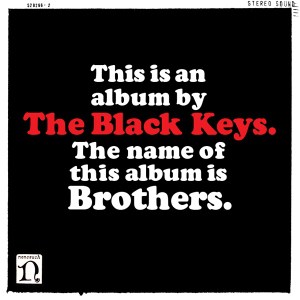 PC: I mean, we have like a relationship that, you know, we named our record Brothers and I’d say that’s the closest description for our relationship. When we first were touring together and starting the band and stuff we were just kind of like neighbourhood buddies. But since then we’re spent, you know, 125 days of the year together at least sometimes 200 for the past 12 years or 13 years. I’ve spent more time with him than my brother, any of my brothers, or my wife.
PC: I mean, we have like a relationship that, you know, we named our record Brothers and I’d say that’s the closest description for our relationship. When we first were touring together and starting the band and stuff we were just kind of like neighbourhood buddies. But since then we’re spent, you know, 125 days of the year together at least sometimes 200 for the past 12 years or 13 years. I’ve spent more time with him than my brother, any of my brothers, or my wife.
MD: And the two of you, speaking of wives, have both gone through kind of hard times in relationships but yours is the one that seems to be the enduring one. That has to kind of, weigh in on you and realise…what makes it so easy for the two of you to remain together?
PC: Yeah, I mean, I got divorced 5 years ago but you know, that’s pretty normal routine stuff. It was just dating somebody, starting when you were like 20, and then finding yourself at 29 that you’re two different people, you know.
MD: Yeah.
PC: When you’re in a relationship like that, the one thing that’s different about a band versus like a relationship is, I think, everybody allows more flexibility with their friends than they do with the people that they are in love with.
MD: Right.
PC: Since then, I have a better understanding of how that whole thing works. I mean, I’m a pretty drama free guy and Dan is too really. Him and I, we just know, we have the kind of relationship where I walk in the room and he’s in there I don’t need to go up to him and start talking to him, he doesn’t need to come up to me and talking to me, you know, we can sit down… you know, we have that thing where we can sit down in silence next to each other for like 8 hours and it’s not awkward.
MD: Right, gotcha. Yeah and what about when you get on stage, is there a point…do you have to kind of achieve getting in sync in some certain way in order for a show to really take off? Is that something that you have to work at anymore or does it just fall into place?
PC: You know, that’s all, it doesn’t have to do with Dan and I, it has to do with usually…not everything’s… like sounding good on stage and the audience is tuned in and it should take right off you know. Sometimes it takes a couple of songs to kinda get the energy right in the room, you know, as cheesy as that sounds like, you know, we’re playing to some fans who are only familiar with the last 2 records, so, we start that off, usually play some stuff off like some earlier records and it’s obvious that a lot of people don’t, some people don’t know some of the songs, you know, so kind of get the groove kind of happening. Like last night in Pittsburgh the show was great, I thought like the crowd was good but the crowd really didn’t like, feel like they really were completely there until like the 7th song or something.
MD: Right.
PC: We played 22 songs. But, its good though.
MD: And does that effect your performance?
PC: I’d rather it work that way than the crowd be absent after the 2nd song or the seventh song. I’d rather have it build than dissipate.
MD: Yeah, does that ever happen?
PC: I’ve never really seen it happen, you know, I mean sometimes you’re up fighting against that especially for us back in the day at festivals because, you know, like the overlap, you know, we’d be going on like at 6 or something, play till 7 or 7 to 8 or whatever. Towards the end of the set, you know, they have an overlap of bigger bands and you see people leaving to go see the bigger band.
MD: Right. Yeah, it’s got to be a little bit soul destroying to see that happen I suppose when you’re playing your heart out and people are wandering off I guess. I imagine that doesn’t happen too much anymore.
PC: It doesn’t, I mean, It doesn’t really bother me.
MD: Yeah.
PC: It didn’t bother us that badly then either because we understood what was going on and we felt lucky to just be able to be playing whatever it was, Coachella or whatever.
MD: Yeah and I guess that the third person that kind of has as much influence on the band as you guys or at least some influences is Danger Mouse. I was hoping if you could talk to me a little bit about how he fits in with the two of you when you’re in the studio together working.
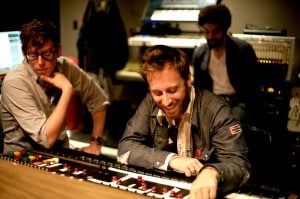
PC: That’s like a relationship that, started in 2007, and the first record we made together was Attack and Release and like at that time, you know, we didn’t really know him, he didn’t know us and that whole experience making that record was just a learning process, him trying to figure out what we were doing and I was trying to figure out what he was capable of doing.
MD: Right, yup.
PC: And, you know, we made this record really quickly, we made that one in like 11 days or something and it was a lot of fun, it was our first time in the studio, our first time having to put in our trust in a stranger. And then we worked on Tighten Up in Brothers. That’s just the only song we did and it became like our first kind of hit single in the US. And when we did that song, we worked differently. That song, Brian didn’t want to produce, he wanted to like co-write with us, he wanted to be a part of the creative side of the song.
MD: And how did you guys react to that?
PC: Well we trusted him so we were up to try anything and it worked out so we went to make our next record, you know, Turn Blue, the same rules were in motion, you know, it was like all three of us, it was like a three part democracy you know.
MD: Yeah.
PC: Alternately it’s like Dan and I’s band so sometimes we’ll over rule like a decision or something, you know, about what goes on the actual album but working with Brian, well you know, we’ve gotten so tight with Brian that I can’t imagine us having that relationship with anybody else.
MD: Right.
PC: When we are working with him it basically becomes like a three person band, you know.
MD: Yeah.
PC: And Brian’s taught us a lot. Like the most important thing he’s taught us like never discredit an idea before you try it. Actually its simple but a really important rule when making music. You know, Dan and I both produce other people’s records and the most common thing you see when working with a band usually is somebody in the band is being like, a prick.
MD: Right.
PC: You’ll suggest something and then they’ll tell you exactly why they don’t want to do it and then you’ll see that this person has like pigeon holed themselves. They defined their band based on what other people think their band should be and that’s like something that, Dan and I kinda found ourselves going through that like around Magic Potion like you know, “we’re a two piece drum and guitar band, we’re a two piece drum and guitar band”. B, you know, the only two piece drum and guitar band we listen to was, well T-Model Ford and Hound Dog Taylor. So like all the music that we are being influenced by was not that.
MD: Right.
PC: That’s why we wanted to work with a producer. That’s why Brian got involved cause’ us figuring out how to break away from this kind of predefined genre, I guess or whatever that we had set up, we put these restrictions on ourselves. At first it probably helped us, you know, and then at one point it just became kind of a creative burden.
MD: Yeah and I suppose you have to deal with people who… fans of yours… who want you to stay there because that’s where they first discovered you and they feel that once you start moving away from that, that somehow they’ve been betrayed by the band.
PC: Yeah, but that’s just what happens, I mean, you know, I’m not comparing ourselves to these bands but I’m just referencing a band like say, Fleetwood Mac.
MD: Yeah.
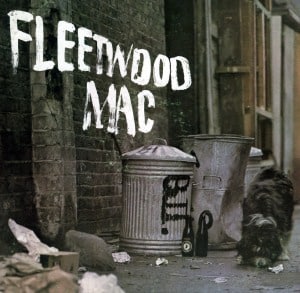 PC: You know like, their first 4 or 5 albums are totally different than their hit records, you know, like the classic first album was completely different.
PC: You know like, their first 4 or 5 albums are totally different than their hit records, you know, like the classic first album was completely different.
MD: Right.
PC: The Clash’s London Calling and The Beatles and so forth, they’re bands that I think have actively pushed themselves to do different kind of things and not get stuck in a rut, you know. So I think those are inspirational bands for us, you know, on that level, on a creative level, you know.
MD: Yeah and I know that Brian was involved with the new U2 album which, you know, has just released for free over iTunes or whatever and I’m wondering if you guys are kind of on the same level where you probably have options to do things like that. I don’t know, what do you think about the idea of doing a release like that and have you had any opportunities like that? Have you thought about doing stuff like that?
PC: I mean like, there’s probably been opportunities to do weird things like that, like for Spotify or something or whatever. You know, I wouldn’t be interested in doing that, you know. I’d rather sell less records and do it the traditional way because there’s only so many more records that are going to be released the traditional way. I’d rather have that experience. You know, there’s nothing quite like making a record and then waiting for it to come out and then the day, you know, everybody get in there at once or around the same time.
MD: Yup.
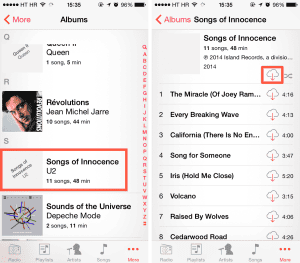 PC: And, you know, we allowed a week of streaming on iTunes a week prior to release which is something that you kinda have to do, just to cut down on people just ripping it and putting it on YouTube or whatever, you know.
PC: And, you know, we allowed a week of streaming on iTunes a week prior to release which is something that you kinda have to do, just to cut down on people just ripping it and putting it on YouTube or whatever, you know.
MD: Yeah.
PC: But even back in 2004…our biggest leaked album weren’t the last two. They figured out how to kind of cut leaks down a little bit but, you know, even with the record like Rubber Factory that leaked like a month before it came out, you know, we weren’t as popular then…you know, it bums me out.
MD: Yeah.
PC: When everybody wanted to get in to hear it for the first time at the same time. Yeah I mean, I don’t know, U2’s is got a whole different thing going on. You know, I think that they made like a really kind of a progressive album, I haven’t heard the final version but you know, obviously Dangermouse played me a bunch of stuff that they worked on. I’m not sure what made the final cut but I heard a lot of kinda cool shit.
MD: Yeah.
PC: And I think that maybe their thinking was just like putting emphasis on wanting people to hear their music which I can get behind 100%
MD: Yeah.
PC: You know, I think like they were probably worried about maybe not having the right single or not having the right commercial thing to get their thing, whatever they want to be. Maybe they just realised what was actually important to them was that people hear it, you know. I can get behind that.
MD: Yeah.
PC: And you know, I’ve seen people say negative things about the record just appearing on their iTunes accounts or whatever but I can think of a lot worse things that can happen than a free album popping up on your iTunes.
MD: Exactly. You mentioned that you like the idea of, you know, anticipating a record and waiting for it to come out and everybody getting it at the same time. Do you remember, you know, back in when you were kinda growing up, waiting specifically for a particular album, who would you have been waiting for?
PC: Yeah well you know, back in Akron, there was only one record store and they didn’t go that deep into indie records. They didn’t carry some stuff through Touch and Go… Matador and Merge but not everything you know.
MD: Yeah.
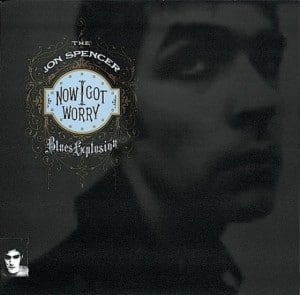 PC: I didn’t get really deep into like indie rock until probably I was like 16. I remember the most excited I think I was for a record when I was in high school…Sonic Youth’s Washing Machine, Pavement Wowee Zowee. These are the records I picked up like the day they came out. Jon Spencer Blues Explosion, Now I Got Worry, that was one.
PC: I didn’t get really deep into like indie rock until probably I was like 16. I remember the most excited I think I was for a record when I was in high school…Sonic Youth’s Washing Machine, Pavement Wowee Zowee. These are the records I picked up like the day they came out. Jon Spencer Blues Explosion, Now I Got Worry, that was one.
MD: Yes.
PC: These are all, you know like, from high school walk directly to the record store, buy the record, walk directly to a friend’s house, listen to it!
MD: I know that you have mentioned that there’s a possibility of you guys getting back in the studio in January, which of course is before the time that you’d be in Auckland in New Zealand.
PC: Yeah somebody ran some fuckin’ made up story. What I said was, I was like, just saying, you know, we’re on tour basically through who knows when, maybe through next summer, but for sure through April of next year. I was just saying we have January off and if we wanted to we could make a record in that time. But yeah, I mean, I don’t really know. I mean at the end I always like to make records. The problem is when you make a record then you have to do a lot of bullshit that comes with it.
MD: Right.
PC: It’s just about taking enough time to prepare the deal. You know, like you do 4 weeks of promo and then, you know, the touring you end up doing. The touring’s the fun part.
MD: Yeah.
PC: If you do it right. But it can also be fucking gruelling if you don’t do it right. It’s a gamble. So this tour has been really fucking good, really fun, really enjoyable. But you know, in 2012, I think we both have like PTSD from like some really hard tours we’ve done, it’s like 2004. 2012 is like a great year for us, but it was slightly traumatic. Just the amount of touring we did, it was unreal, I think we played like a 120 shows. It was like a 195 travel and show days, at least that, and it was basically us playing arenas for the first time, heading festivals for the first time so it’s all these like big huge experiences all happening like you know, like within a month, we headlined MSG for the first time twice, we played live on CBS for the NCAA championship and then we headlined Coachella.
MD: Right.
PC: and on top of that we played like 20 other shows. So I think like looking to the next record is just about how much you want to bite off, you know.
MD: Yeah, it can be fairly daunting I imagine.
PC: I think every musician, I think secretly is envious of Tom Waits.
MD: Right.
PC: Because of his entire approach to it, you know but you got to be Tom Waits to be Tom Waits.
Click here for more information about The Black Keys’ New Zealand tour dates.
- Challengers – Dir: Luca Guadagnino (Film Review) - April 24, 2024
- Civil War – Dir: Alex Garland (Film Review) - April 9, 2024
- Pearl Jam – Dark Matter (Monkeywrench/Republic) Album Review - April 1, 2024

